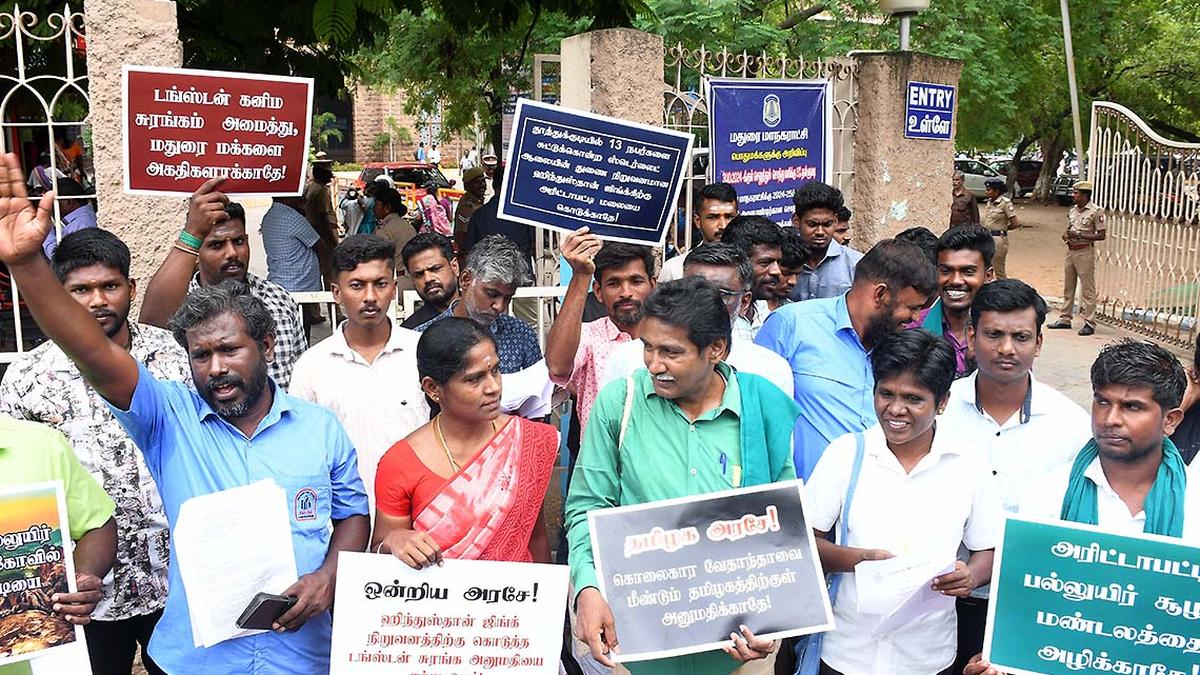what’s the row over tungsten mining near madurai

Environmental activists raised slogans outside district Collector office on Monday against Vedanta’s auction win for mining tungsten from areas in Madurai.
| Photo Credit: The Hindu
The story so far: The Ministry of Mines recently announced it had granted tungsten mining rights to Hindustan Zinc Limited, a subsidiary of Vedanta Limited, through an auction on November 7. One of the areas chosen was a band in Melur in Madurai district. Following protests, the State government of Tamil Nadu said that it would soon pass a resolution to reject it.
What does the Ministry say about mining?
The Union government, through a statement on November 7, stated that the Ministry of Mines had successfully concluded the auction of eight critical mineral blocks, launched under Tranche IV of the auction of critical and strategic mineral blocks. It attributed the success of the auction to the Mines and Minerals (Development and Regulation) Act, 1957, which leveraged the Union government’s authority to grant mineral concessions for key minerals listed in Part D of the First Schedule. Following the issuance of the Notice Inviting Tender (NIT) on June 24 for 21 mineral blocks, 10 mineral blocks advanced to the second round of e-auction. They contained deposits of strategic minerals such as phosphorite, graphite and vanadium, essential for high-tech and green energy applications.

As the Nayakkarpatti tungsten block is one among eight blocks selected for mining, the Mineral Exploration and Consultancy Ltd. of the Ministry of Mines in its report noted that the 2,015.51 hectares earmarked for tungsten mining was found to be rich in scheelite — an important ore of tungsten. The water source for mining in the area was listed as the Periyar canal.
Why is there opposition?
The public, environmental activists and politicians have staunchly opposed the move to start tungsten mining in the biodiversity-rich heritage area at Melur. Though the Ministry claimed that it had taken inputs from the Tamil Nadu government, which reportedly showed no opposition before the auction, Chief Minister M.K. Stalin urged Prime Minister Narendra Modi to cancel the mining rights awarded to the private firm before announcing that the State government would pass a resolution to cancel mining rights. The earmarked area for mining comprises Melur, Terkutteru, Muthuvelpatti, Kulanipatti, Kidaripatti, Etimagamalam, Arittapatti, Vallalappatti, Sillippyapatti, Chettiyarpatti, and Nayakkarpatti.

Locals and environmental activists fear that mining would destroy its rich flora and fauna in addition to distorting its cultural significance. The major argument raised by opposing voices is the location’s significance as a biodiversity heritage site, declared by the Tamil Nadu government through a notification in November 2022, to protect the site comprising 139.63 hectares in Arittapatti village (Melur block) and 53.8 hectares in Meenakshipuram village (Madurai East taluk) from quarrying and other developmental activities.
Though the Ministry had explained that out of the total area of 20.16 sq.km, only 1.93 sq.km within Arittapatti and Meenakshipuram villages had been notified as a biodiversity heritage site, activists are sceptical about the impact of mining on the environment and cultural sites like temples and Jain beds located around the area.
R.S. Mugilan, an environmental activist known for his protest against projects like Sterlite, Kudankulam Nuclear Power Plant, hydrocarbon Project in Neduvasal, and Neutrino project, said, “Vedanta — the company that won the auction for tungsten mining, is known for pollution practices at its copper smelting unit in Thoothukudi.” Highlighting issues from the climate change perspective, Poovulagin Nanbargal, an environmental organisation based in Tamil Nadu, notes that the tailings (the left-over materials from the processing of mined ore) when stored after the mining extraction, would release heavy metals like copper, cadmium, zinc, lead, arsenic, and would be detrimental to humans and the environment.
Is there a Centre-State rift?
Though the State government says it vehemently opposed the mining of tungsten block in Melur, the Union government alleges: “Since February 2024, when the block was first put to auction till the declaration of result of the auction of November 11, there was no communication from any quarter including the State government regarding any opposition to the auction. Nor did the State government request the Union government to drop the block from auction.” However, the State Minister for Water Resources pointed out that repeated conversations were held with the Union government over mining. He clarified: “When the Union government sought the details of the land, we had pointed out that there was a biodiversity heritage site at the proposed area. Without taking into account such factors, the Union government has awarded the rights to the company.”
Published – December 08, 2024 02:00 am IST









